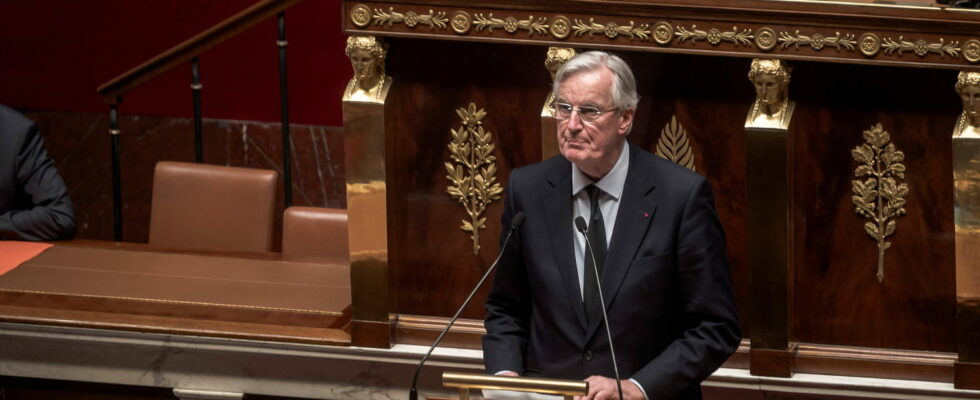The motions of censure filed by the NFP and the RN against the Barnier government will be debated this Wednesday at 4 p.m., and the vote will take place in the evening, in the National Assembly.
Is Michel Barnier’s government living its final hours? Monday, December 2, the Prime Minister held his government accountable for the text of the PLFSS by activating article 49.3 of the Constitution. The same day, two motions of censure were filed immediately. A first by the NFP: Ms. Mathilde Panot, Mr. Boris Vallaud, Ms. Cyrielle Chatelain, Mr. André Chassaigne and 181 of their colleagues will vote for it. One second, one hour later, by Ms. Marine Le Pen, Mr. Éric Ciotti and 138 of their colleagues will take the vote, specifies the National Assembly.
These motions of censure will only be studied and debated from Wednesday December 4 (48 hours after its submission), at 4 p.m., according to information from RTL. In other words, Michel Barnier’s government will only officially fall tomorrow, if that were the case. The vote “should take place around 7 p.m.”, according to information from BFMTV. “After the debates, the vote will only take place in the evening,” specifies Le Parisien. This leaves a period of time – relatively short – for the current tenant of Matignon to try by all means to convince Marine Le Pen, the RN or left-wing deputies to change their minds about their vote.
As a reminder, when a government takes responsibility for a text, it is no longer negotiable, down to the comma. If the RN decides to no longer censor the executive, it will have to accept the text as it stands. Concerning the motion of censure tabled by the left, the RN has already announced that it would vote on motions “wherever they come from”. On the other hand, there is nothing to say whether or not the NFP will vote for the one tabled by the flame party.
The conditions for the motion of censure to be adopted
The rule is simple: for a motion of censure to succeed and overthrow the government, it must be adopted by the absolute majority of deputies sitting in the Assembly on the day of the vote, i.e. 289 if all elected officials are present. The 181 deputies from the four left-wing groups forming the New Popular Front (NFP) – La France insoumise (LFI), the Socialist Party (PS), the Ecologists and the French Communist Party (PCF) are decided. To these can be added all or part of the votes of the 23 Libertés, Indépendants, Overseas and Territories (Liot) deputies who also rejected and amended the government’s initial project on the 2025 budget. But these votes, which are not guaranteed, will not be sufficient for the success of a motion of censure.
Everything depends on the vote of the 138 elected representatives of the RN and “Ciottistes”: and the latter should come together in voting for the motion of censure of LFI, as announced by the party this Monday. 319 elected officials could therefore vote in favor of the motion. A few days ago, Marine Le Pen noticed that Michel Barnier was “standing firm” while she listed “for the umpteenth time” the conditions set by her party to vote on the finance bill and not support a motion of censorship. The inflexibility of the tenant of Matignon on the indexation of pensions to inflation – one of the red lines drawn up by Marine Le Pen – could cost him his place.
New Prime Minister, deadlines… What about after Barnier?
Subsequently, if Michel Barnier falls, Emmanuel Macron will be forced to appoint a new Prime Minister. Michel Barnier could stay on for a while as a resigning minister to manage current affairs. In this case, article 45 of the organic law relating to finance laws (LOLF) allows the country to operate without a government and without a voted budget. This “joker” is based on a “special bill authorizing it to collect existing taxes”, until the vote on a next finance bill at the start of next year. In other words, by continuing to apply the 2024 Budget.
For the PLF, if the debates for the adoption of the finance bill (PLF) exceed 70 days, “the provisions of the finance bill may be brought into force by ordinance”, indicates article 47 of the Law fundamental. This is the last constitutional hypothesis. LCP recalls that the end of the constitutional deadline is set for December 21, 2024, this year. On the other hand, for the PLFSS, an emergency system has never been used in France. The procedure then remains “very vague”, recognizes Public Senate.
The head of state could also decide to appoint a government of experts, known as “technical”. This government would be made up of senior civil servants and/or specialists in their field. The name of Thierry Beaudet, president of the Economic and Social Environmental Council, had been circulating for a while to replace Gabriel Attal. The possibility of seeing a left-wing personality at Matignon seems relatively low.
